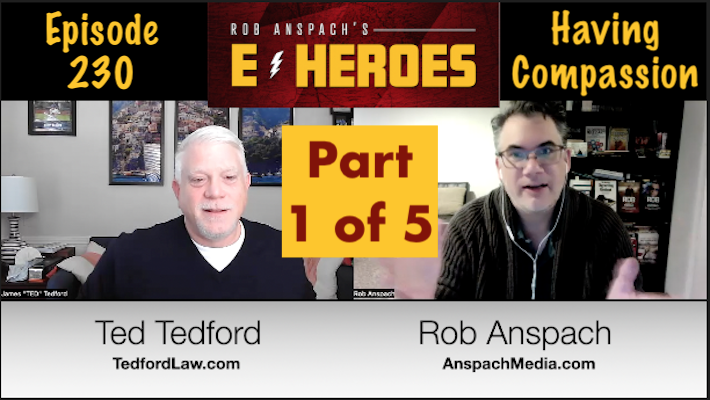Pasadena Criminal Defense and Personal Injury Attorney Ted Tedford sits down with Rob Anspach and shares his thoughts on establishing liability, negotiating the legal system, pain management, mentoring, integrity and self-care on episode 230 of the E-Heroes podcast. This is Part 1 of 5.
Rob Anspach:
Hey, this is Rob Anspach, and welcome back to another edition of E-Heroes. This is episode 230. And, you know, we live in this world where lawyers are not compassionate, I’m not saying they’re not all that way, but there’s a few of them out there that want to be emphatic to their clients. They want to have that friendly family understanding that they are there for them. So I brought on Pasadena attorney, James “Ted” Tedford, and we’re going to have a nice chat. So, welcome Ted, and thanks for being here.
Ted Tedford:
Good morning, Rob. Thanks a lot.
Rob Anspach:
You know what really surprises me is, is you actually put it on your website. You know you’re there for them. I mean you understand that compassion because of your past circumstances that led you to become a lawyer. Can you share that?
Ted Tedford:
Sure. Yeah, I mean, when I went to law school, I went to be a sports lawyer, wanted to be an agent. But after my second year of law school, after I had just gotten married, I was in a very severe rear-end car accident where I was rear-ended at a complete stop. And the car behind me was doing about 65 miles an hour, caused my car to roll over. And it ultimately resulted in two cervical disc herniations at 23 years old. As a result I spent the next almost 30 years fighting and battling against the pain of having severe neck injury. I had epidural injections, I had chiropractic care, accu-pressure, acupuncture, you name it. And ultimately, it resulted in me having to have, um, spinal surgery.
Rob Anspach:
Wow.
Ted Tedford:
And, so as a result, I was literally in the same position as my clients.
Rob Anspach:
And so, one day you just decide, “Hey, I need to be a lawyer. I need to defend others. I need to prevent others from basically getting the injuries that I have, or at least getting compensated for them.”
Ted Tedford:
Yeah. I mean, well, the real injustice in my case was the person that hit me was uninsured and being a young adult scraping by to get through law school, I had pretty minimal insurance coverage. And at that time, I had the minimum uninsured motorist policy of $15,000. So I got 15,000 bucks to carry me through the next 30 years of treatment.
Rob Anspach:
You know, I see these ads all the time, you know, and I’m not going to point fingers at Geico or these other TV ads that insurance companies run. I mean, I think everybody needs insurance, should have it, but having not enough is awful. And you know, when you’re advertising, this is a way to get cheap insurance, so you’re legal, but you get into an accident and you’re under underinsured, that’s just causing pain to you or someone else. And, now they got to probably sue and you’re going to get sued for not having enough insurance. And, it’s terrible. I don’t understand why they do it.
Ted Tedford:
Well, I mean, that’s the trick. They do it because that’s how they make money. I mean, those insurance companies are profit bearing companies, and they’re looking at the bottom line all day long. So they can put the friendly lizard with the English accent or the Good Hands people or whatever the flavor of the week is, as far as getting people to think they’re chummy and nice. But on the flip side, once you assert a claim against an insurance company, they’re going to do everything they can to pay the least amount possible.
Rob Anspach:
Right. And, you go after ’em.
Ted Tedford:
Absolutely
Rob Anspach:
To the fullest extent. And sometimes, yeah, okay, you’re going to save maybe a couple hundred dollars on your insurance, but at the end when the accident’s all over and you go to court, and now you’re looking at, a million dollars that the insurance is paying out, or if you don’t have enough, or if you don’t have enough insurance, maybe you have to sell your house or your assets to cover it.
Ted Tedford:
I have a perfect example right now of a recent client who got rear-ended. She was doing nothing but driving on the freeway, and the traffic stopped. She got blasted from behind by a truck, and she has no uninsured motors policy. And the truck that hit her was uninsured, and she’s in the hospital. Wow. Yeah. She had 37 fractures, collapsed lung, broken femur. You can imagine. Yeah. The pain, the uncertainty she doesn’t know where she’s going to live when she gets out of the hospital. She doesn’t have family close by to take care of her. And she’s in her late sixties.
Rob Anspach:
Yeah. I see these accidents. I just I witnessed a motorcycle accident just the other day, and, but I couldn’t stop because of the way the traffic was flowing. But you saw the guy who was all gnarly on the ground, and his arms and legs were all twisted, and you just know driving past him, he would’ve never made it to the hospital.
Ted Tedford:
Yeah.
Rob Anspach:
Yeah. It’s just, so people come to you they’re in their weakest moment. They’re frustrated, they’re annoyed, they’re angry. And, and so what’s the process? I mean, how do you deal?
Ted Tedford:
I mean, the first thing you have to do, obviously when you go through the intake is to get to know the individual and find out about all the facts surrounding the accident to establish liability. But then from there, we have to find out what kind of insurance they have. If they have insurance, you know, people don’t realize, I don’t think that just because you have a health insurance doesn’t mean you’re going to get the right treatment. Right. And, there are a variety of health insurance policies out there, and some are A plus premium Cadillac insurance, and you can go to any doctor you want, any specialist, you can get MRIs and you can get, cat scans and physical therapy and hyperbaric chamber and all kinds of crazy stuff out there that your insurance will pay for.
Ted Tedford:
But the average person has kind of, to be honest, crappy insurance. They are part of an HMO. They have to go to a primary care physician during the last few years with covid that has made it so challenging to get clients in to see their doctors because most of them didn’t want people in their offices. So they were then resorting to Tele-med and video-med. But that doesn’t help somebody get better, and it certainly doesn’t establish a personal connection with the doctor so that the doctor understands the person’s injuries and how they’re progressing. So I think one of the main elements that we, the service that we provide is helping to guide people through their medical recovery, making sure that if they have a concussion, that they get evaluated for a traumatic brain injury, that and a lot of those things are available.
Ted Tedford:
We send them to doctors that will work on what’s called a lien. And a lien is where basically you get the treatment upfront and you don’t have to pay for it immediately. It’s delayed until your case settles, or you go to trial and get a jury verdict. Insurance companies hate that. They try to do everything they can to make it look bad, like the attorney is practicing medicine and telling them where to go, when in reality that’s just not true. We send them to a pain management doctor. Which is essentially a primary care physician who quarterbacks their treatment, sends them to physical therapy if they need therapy, sends ’em for x-rays. If they need x-rays. To neurology, to orthopedics. Ultimately I’ve had many clients who’ve had neurosurgeons operate on their back and their neck on a lien. And like I said, insurance companies don’t like it. But what they’ll do on the flip side is if you stay with your own insurance and you have difficulty getting in to see your doctor, then they complained that there was a gap in treatment and you weren’t taking it upon yourself to mitigate your damages and try and get in and take care of the problem and you’re malingering.
Rob Anspach:
Mm-hmm.




